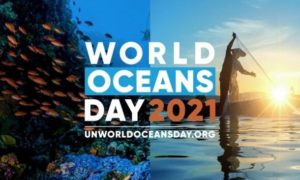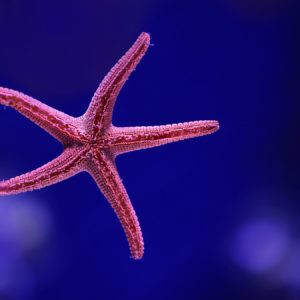Nouvelle
World Oceans Day 2021
Covering more than 70% of the Earth's surface, oceans are essential to human lives and livelihoods. World Oceans Day is the occasion to raise awareness of the benefits humankind derives from the ocean and our individual and collective duty to to use its resources sustainably. Discover more about the vital role oceans play in our lives and the work that is being done in Geneva to preserve marine environments and foster a more sustainable blue economy.
Celebrating the Oceans
The ocean is our planet’s largest ecosystem. It stabilizes climate, stores carbon, nurtures unimaginable biodiversity, and directly supports human well-being through food and energy resources, as well as by providing cultural and recreational services. Unfortunately, despite improved management and conservation actions, the UN Second World Ocean Assessment, launched in April 2021, found that pressures from many human activities continue to degrade the ocean and destroy essential habitats. As the world population will reach an estimated 9 billion people by 2050, impacts on the ocean associated with human activities will increase.
World Oceans Day, celebrated each year on 8 June, reminds every one of the major role the oceans have in everyday life. The purpose of the Day is to inform the public of the impact of human actions on the ocean, develop a worldwide movement of citizens for the ocean, and mobilize and unite the world’s population on a project for the sustainable management of the world’s oceans.
“The Ocean: Life and Livelihoods” is the theme for World Oceans Day 2021, as well as a declaration of intentions that launches a decade of challenges to get the Sustainable Development Goal 14, “Conserve and sustainably use the oceans, seas and marine resources”, by 2030.
UN Decade of Ocean Science for Sustainable Development
This year, World Oceans Day will see the launch of the the UN Decade of Ocean Science for Sustainable Development (2021-2030). The Ocean Decade will provide an opportunity for nations to work together to generation the global ocean science needed to support the sustainable development of our shared ocean.
The Ocean Decade provides will to create a new foundation across the science-policy interface to strengthen the management of our oceans and coasts for the benefit of humanity, and strengthen the international cooperation needed to develop the scientific research and innovative technologies that can connect ocean science with the needs of society.
It will also contribute to the UN processes protecting the ocean and its resources, such as the SAMOA Pathway, the United Nations Convention for the Law of the Sea, the post-2020 framework for the Convention on Biological Diversity and the Sendai Framework for Disaster Risk Reduction.
The Ocean Decade requires the engagement of many different stakeholders to create new ideas, solutions, partnerships and applications, these include: scientists, governments, academics, policy makers, business, industry and civil society.
The Importance of Oceans
The ocean covers over 70% of the planet. It is our life source, supporting humanity’s sustenance and that of every other organism on earth. The ocean produces at least 50% of the planet’s oxygen, it is home to most of earth’s biodiversity, and is the main source of protein for more than a billion people around the world. Not to mention, the ocean is key to our economy with an estimated 40 million people being employed by ocean-based industries by 2030.
Even though all its benefits, the ocean is now in need of support. With 90% of big fish populations depleted, and 50% of coral reefs destroyed, we are taking more from the ocean than can be replenished. To protect and preserve the ocean and all it sustains, we must create a new balance, rooted in true understanding of the ocean and how humanity relates to it. We must build a connection to the ocean that is inclusive, innovative, and informed by lessons from the past.
Stopping Plastic Pollution
Plastic pollution is found everywhere from the Mount Everest to the Mariana Trench, and the deepest part of the oceans. Of the approximately 275 million metric tons of plastic waste produced annually, up to 12 million tons leak into oceans, wreaking havoc on livelihoods and ecosystems . The result is an estimated $13 billion in annual environmental damage to marine ecosystems.
In 2017, the UN Environment Assembly established the Ad Hoc Open-Ended Expert Group (AHEG) on Marine Litter and Microplastics. The expert group concluded its work ahead of UNEA-5.1 in February 2021 and has put forward a series of possible policy responses to reduce plastic pollution in marine environments. Attention is now turned to UNEA-5.2 in February 2022, as many governments, civil society and business organisations are calling for the establishment of an international treaty on plastic pollution.
Ending Overfishing
More than 820 million people depend on fisheries and aquaculture for food, nutrition, and income (FAO, n.d.). But the ability of the world’s fisheries to provide jobs and nutrition is being threatened by an unprecedented crisis of overfishing and improper resource management. The Second World Ocean Assessment revealed that, while fisheries management is improving in many regions, a third of global stocks are still overfished.
Efforts to reverse the trend are thus essential to secure livelihoods and food security and protect biodiversity. Scientific findings indicate that 98% of currently overfished stocks could recover by the middle of this century if managed properly. At the global level, negotiations on fisheries subsidies, which can contributes to overfishing, are ongoing at the World Trade Organisation (WTO) in order to achieve SDG 14.6. On World Oceans Day 2021, WTO Director-General Ngozi Okonjo-Iweala and Ambassador Santiago Wills, chair of the Negotiating Group, reiterated their call to governments to conclude negotiations and reach an agreement at the ministerial meeting in July 2021
Fostering Sustainable Blue Economy
The oceans support the livelihoods of more than 3 billion people. The value of the oceans economy sectors, such as fisheries, maritime transport, coastal tourism, off-shore energy and marine bio prospecting, has been estimated at about 3 trillion USD annually. Worryingly, the current mode of operating of oceans economic activities is no longer sustainable. The natural assets that the blue economy depends on are fast eroding under the pressure of human activities.
Therefore, we need to diversify towards economic activities that will have a lower impact on ecosystems, while sustaining livelihoods and stimulating job creation. It’s possible to combine production from the ocean while protecting its economic, social and environmental value for the future. The UN Decade of Ocean Science will be an opportunity to maximize the benefits of effective science-based management of our ocean space and resources.
Role of Geneva
Various Geneva-based organizations or secretariats – listed below in alphabetical order – work actively to protect and restore the oceans and promote a sustainable blue economy. UN system’s engagement with oceans-related issues also goes beyond Geneva, with organizations around the world involved, such as the UN Environment Programme (UNEP) and the Food and Agriculture Organization (FAO).
Convention on International Trade in Endangered Species of Wild Fauna and Flora (CITES)
CITES is a multilateral agreement to ensure that international trade in specimens of wild animals and plants – including listed marine species – does not threaten their survival.
Food and Agriculture Organization Liaison Office in Geneva
The FAO Geneva Office works with the Fisheries Division to strengthen global governance and the managerial and technical capacities of members and to lead consensus-building towards improved conservation and utilization of aquatic resources.
Group on Earth Observations (GEO)
GEO is a partnership of more than 100 national governments and in excess of 100 Participating Organizations that envisions a future where decisions and actions for the benefit of humankind are informed by coordinated, comprehensive and sustained Earth observations. GEO is contribute to the Ocean Decade by providing data and observations on the status of the oceans, for instance through the GEO Blue Planet Initiative.
Intergovernmental Panel on Climate Change (IPCC)
The IPCC is the United Nations body for assessing the science related to climate change. Its reports provide scientific knowledge on the role of oceans in regulating climate change and the impacts of global warming on the oceans. The Special Report on the Ocean and Cryosphere in a Changing Climate, published in 2019, provides an extensive review of the state of science in the field of climate science in marine environments.
International Institute for Sustainable Development (IISD)
The IISD is an independent think tank working to create a world where people and the planet thrive. The Institute supports the current WTO negotiations to end harmful fisheries subsidies, recognizing the need to restore the sustainability of fish stocks while supporting livelihoods and food security.
International Union for Conservation of Nature (IUCN)
IUCN is the world’s largest conservation network with the mission to influence, encourage and assist societies throughout the world to conserve the integrity and diversity of nature. The IUCN Red List is the world’s most comprehensive information source on the global extinction risk status of animal, fungus and plant species – including marine species. IUCN also advocates to influence policy and international agreements for a sustainable management of fisheries and aquaculture worldwide.
Luc Hoffman Institute
The Luc Hoffmann Institute follows the principles of systems thinking, convening and co-creation to incubate and accelerate new ideas and approaches that will deliver significant gains for biodiversity. By convening a wide range of stakeholders, the institute is a leading catalyst for innovation and transformative change to maintain biodiversity, in both terrestrial and marine ecosystems.
Mava Foundation
Founded by naturalist Luc Hoffman, MAVA supports conservation that benefits people and nature. MAVA accompanies key partners on their conservation journey, helping them develop the skills they need and strengthening their ability to deliver. Engaged in favor of marine and coastal biodiversity, MAVA committed 70 million euros from 2017 to 2022 to the conservation of marine biodiversity in the Mediterranean Basin and in West Africa.
Oceana
Oceana is an international organization focused on oceans, dedicated to achieving measurable change by conducting specific, science-based policy campaigns with fixed deadlines and articulated goals. Since its founding, Oceana has won over 200 victories and protected more than one million square miles of ocean.
Partnership for Environment and Disaster Risk Reduction (PEDRR)
PEDRR is the clearinghouse for knowledge, training, advocacy and practice on Ecosystem-based Disaster Risk Reduction (Eco-DRR). PEDRR is reinforcing knowledge to manage ecosystems,including coastal systems, in a way to reduce physical exposure to many hazards and increasing socio-economic resilience of people and communities.
The SeaCleaners
The SeaCleaners fights for a pollution-free ocean, by integrating economic, social, human, educational and scientific perspectives in a dynamic and solidarity-based project. The SeaCleaners is active on several fronts: raising awareness and promoting prevention, sharing scientific knowledge, accelerating the transition to a circular economy, and developing innovative solutions for waste collection and repurposing on land and at sea.
United Nations Conference on Trade and Development (UNCTAD)
UNCTAD is supporting developing countries to identify the opportunities and challenges that the oceans economy can bring. It also supports national trade and other competent authorities to design and create an enabling policy and regulatory environment that promotes the development and emergence of a sustainable blue economy.
United Nations Economic Commission for Europe (UNECE)
The UN Fisheries Language for Universal Exchange (UN/FLUX) developed under UNECE’s UN/CEFACT enables the automatic exchange of fisheries data. This is crucial in the fight against Illegal, Unreported and Unregulated fishing practices. UN/FLUX is now implemented in EU member states, with preparations underway to control fish stocks in the North-East Atlantic.
World Economic Forum (WEF)
The WEF is an international organization for public-private cooperation shaping shape global, regional and industry agendas. Its work on oceans aims to shape a new ocean economy, addressing the interlinkages between oceans, climate change, biodiversity, technologies, governance and more. The WEF convenes the Friends of Ocean Action – a coalition of over 65 ocean leaders who are fast-tracking solutions to the most pressing challenges facing the ocean. It also hosts the Global Plastic Action Partnership which supports the transition to a circular plastics economy.
World Meteorological Organisation (WMO)
As a specialized agency of the United Nations, WMO is dedicated to international cooperation and coordination on the state and behaviour of the Earth’s atmosphere, its interaction with the land and oceans, the weather and climate it produces, and the resulting distribution of water resources.
World Trade Organisation (WTO)
The WTO is the only global international organization dealing with the rules of trade between nations. Since 2001, WTO members are negotiations rules to eliminate subsidies for illegal, unreported and unregulated fishing and to prohibit subsidies that contribute to overcapacity and overfishing, with special and differential treatment for developing and least developed countries.
World Wildlife Fund for Nature (WWF)
WWF is one of the leading organization in wildlife conservation and endangered species, including in marine environmentd. WWF works to help local communities conserve the natural resources they depend upon; transform markets and policies toward sustainability; and protect and restore species and their habitats.
Events
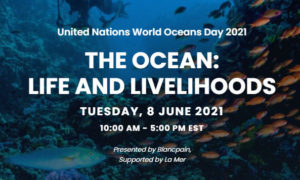
The Ocean: Life and Livelihoods
Official global celebration | 8 June 2021 | 16.00 – 23.00 CEST
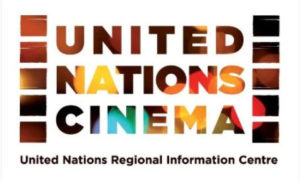
Ciné-ONU | Silent Fish
8 June 2021 | 19.00 CEST

Harnessing the benefits of the ocean economy for sustainable development
UNCTAD15 pre-event | 9 June 2021 | 14:00 – 16:30 CEST | Online
Learning
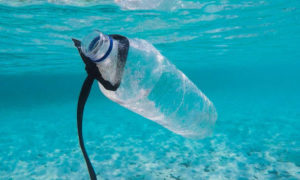
Introductory Course to the International Legal Framework on Marine Pollution
InforMEA | Online course

Introductory Course to the International Legal Framework on Marine Biodiversity
InforMEA | Online course

Introductory Course to Marine Biological Diversity of Areas Beyond National Jurisdiction
InforMEA | Online course
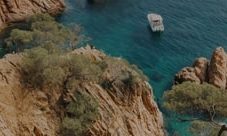
Introductory Course to the Mediterranean Action Plan and the Barcelona Convention
InforMEA | Online course
Latest News & Resources
- UN World Oceans Day – Official Website
- UN Decade on Ocean Science for Sustainable Development – Official Website
- World Oceans Day – 8 June | UN
- The Second World Ocean Assessment (WOA II) | UN | April 2021
- World Oceans Day: Life and Livelihoods | WMO | 7 June 2021
- End war on nature and ensure ocean health, UN chief says in message for World Oceans Day | UN News | 8 June 2021
- Message from WTO DG & Chair of the Negotiating Group on fisheries subsidies for World Oceans Day 2021 | WTO | 8 June 2021
- World Oceans Day 2021 – Life and livelihoods | FAO | 8 June 2021
- A blueprint for a living planet: why we need to tackle climate and ocean crises together | WWF | 8 June 2021
- WWF highlights urgent need for integrated strategies to tackle ocean and climate crises | WWF | 8 June 2021
- World Oceans Day 2021 | The SeaCleaners | 8 June 2021
- Turning the tide: How to finance a sustainable ocean recovery | UNEP FI | March 2021

